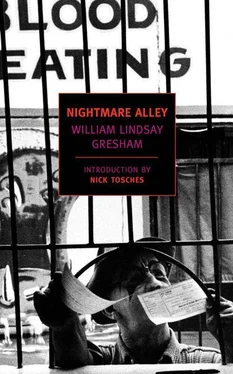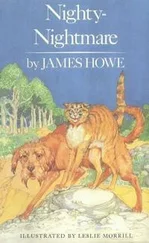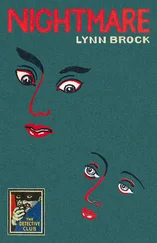Good Christ, was this guy never going to shut up and get out for a minute? Just one minute would be enough. On the shelf over Jerry’s head. 1900 .
“She was raising hell. She says, ‘Jerry’-you shoulda heard her; you wouldn’t believe it-‘Jerry, I think you might have the decency’-those was her very words-‘I think you might have the decency not to put men and women together in the same refrigerator compartment!’ Can you beat that? I says to her, I says, ‘Miss Leary, do you mean to insinuate that I should go encouraging homo-sex-uality amongst these corpses?’ ” Jerry leaned back in his swivel chair, slapping his thigh, and his companion laughed until tears came, getting the tightness worked out of his nerves.
“Oh, you shoulda heard her rave then! Wait a minute-there’s the phone.” He listened, then said, “Right away, keed,” and pushed back his chair. “Got a customer. Be right back. Gimme a shot before I go.”
His hard heels rang off down the corridor. The elevator stopped, opened, closed, and hummed as it went up.
1900 . May 28th. Age: 95, 80, 73, 19… 19… Doris Mae Cadle. Diagnosis: septicemia. Admitted-hell, where was she from? No origin. Name, age, diagnosis. The only young one on the 28th and on the page before and after it. The elevator was coming down and he shoved the ledger back in its place.
Jerry stood in the doorway, swaying slightly, his face glistening. “Wanna give me a hand? A fat one! Jesus!”
“No. She ain’t lived here in my time. ’Course, I only took over the house eight years ago. Mis’ Meriwether had the house before me. She’s been in the Home for the Blind ever since. Cataracts, you know.”
A soft, cultured voice said: “Mrs. Meriwether, I hate to bother you with what is, after all, only a hobby of mine. I am a genealogist, you see. I am looking up the branches of my mother’s family-the Cadles. And in an old city directory I noted that someone by that name lived at the house which you ran as a rooming house about thirty-five years ago. Of course, I don’t expect you to remember.”
“Young man, I certainly do remember. A fine girl she was, Doris Cadle. Remember it like it was yesterday. Some kind of blood poisoning. Took her to the hospital. Too late. Died. Buried in Potter’s Field. I didn’t know where her folks was. I would have put up the money to get her a plot only I didn’t have it. I tried to get up a purse but none of my roomers could make it up.”
“She was one of the Cadles of New Jersey?”
“Might a been. Only, as I recall, she come from Tewkesbury, Pennsylvania.”
“Tell me, Mrs. Meriwether, are you related to the Meriwethers of Massachusetts?”
“Well, now, young man, that’s right interesting. I had a grandmother come from Massachusetts. On my father’s side she was. Now, if you’re interested in the Meriwethers-”
“Mrs. Cadle, I thought I had all the data I needed but there are a couple of other questions I’d like to ask for the government records.” The dark suit, the brief case, the horn-rimmed glasses over a polka-dot bow tie, all spoke of the servant of government.
“Come in. I been tryin’ to find Dorrie’s pitcher. Ain’t seen it sence I showed it to you a while ago.”
“Doris Mae. That was your second child, I believe. But you put the picture back in the Bible, Mrs. Cadle.”
His voice sounded dry and bored. He must get awful tired, pestering folks this way all day and every day.
“Let’s look again. Here-here it is. You just didn’t look far enough. Did I ask you the date of your daughter’s graduation from high school?”
“Never graddiated. She took a business course and run off to New York City and we never seen her no more.”
“Thank you. You said your husband worked in the mines from the age of thirteen. How many accidents did he have in that time? That is, accidents that caused him to lose one or more days from work?”
“Oh, Lord, I can sure tell you about them! I mind one time just after we was married…”
The collector of vital statistics walked slowly toward the town’s single trolley line. In his brief case was a roll of film recording both sides of a postcard. One was a cheap photograph of a young girl, taken at Coney Island. She was sitting in a prop rowboat named Sea Breeze , and holding an oar. Behind her was a painted lighthouse. On the message side was written in precise, characterless handwriting:
Dear Mom and all,
I am sending this from Coney Island. It’s like the biggest fair you ever saw. A boy named Spunk took me. Isn’t that a silly nickname? I had my picture taken as you can see. Tell Pop and all I wish I was with you and hug little Jennie for me. Will write soon.
Fondly,
DORRIE
Conversation flattened out to an eager rustle as the Rev. Carlisle entered the room and walked to the lectern in the glass alcove, where ferns and palms caught the summer sun in a tumult of green. The rest of the room was cool and dark, with drawn hangings before the street windows.
He opened the Bible with the gold-plated clasps, ran his hands once over his hair, then gazed straight out above the heads of the congregation which had assembled in the Church of the Heavenly Message.
“My text this morning is from Ephesians Five, verses eight and nine: ‘ For ye were sometimes darkness, but now are ye light in the Lord: walk as children of light: for the fruit of the Spirit is in all goodness and righteousness and truth …”’
Mrs. Prescott was late, damn her. Or was it the mark who was holding up the works? He must be the kind of bastard that always comes late-thinks the world will hold the curtain waiting for him.
Blue eyes lifted from the page and smiled their blessing on the faces before them. About twenty in the house with a few odd husbands dragged along; and a couple of male believers.
“Dearly beloved, on this day of summer, with God’s glorious sunlight illuminating the world, we find an object lesson in its brilliance…”
Where was Tallentyre? She was supposed to ride herd on Prescott and the mark.
“… for we, who once walked in darkness of fear and ignorance and doubt, find our path through the earth-plane made bright and shining by the surety of our faith.”
At the other end of the shadowy room the front door opened and closed. In the dim light two stout women in flowered print dresses came in-Tallentyre and Prescott. Son-of-a-bitch! Did the chump back out at the last minute? With a flash of anxiety Stan wondered if somebody might have wised him up.
Then in the doorway a man appeared, big, in a light gray flannel suit, holding a panama in his hand. A black silhouette in the gentle glow cast by the fanlight. The spread of shoulder spoke of arrogant ownership. The man was an owner-land, buildings, acres, machines. And men. Two round, owl-like saucers of light winked from the dark head-the light of the conservatory reflected from rimless glasses as he turned his head, whispering to Prescott. Then he sat down in the back row, pulling out one of the bridge chairs to make room for his legs.
The Rev. Carlisle drew breath and fixed his eyes on the gold-embossed Bible before him.
“My dear friends, let me tell you a story. There was a man who had been in the Great War. One dark night he was sent scouting into No Man’s Land with one of his buddies-a star shell rose from the enemy trenches and illuminated the field. Well might he have prayed at that moment with David, ‘ Hide me from my deadly enemies who compass me about .’ The man of whom I speak dashed for the security of a shell hole, pushing his companion aside, while the machine guns of the Germans began to fill the field with death.”
Ezra Grindle was fanning himself idly with his panama.
Читать дальше












